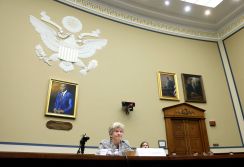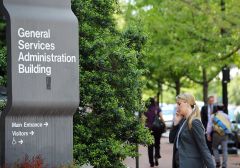GSA charges forward with digital transformation amid pandemic

The General Services Administration has kept its focus fixed on digital transformation, even as a national emergency continues to impact the normal operations of its workforce.
CIO David Shive told FedScoop in a recent interview that because the agency invested so heavily in enabling telework for its workforce in recent years, disruptions were minimal when the coronavirus forced most of GSA’s employees to work remotely over the past two months. Instead, “it’s been business as usual for GSA,” with more than 90 percent of the agency’s workforce able to telework on a daily basis, up from the roughly half of employees who were able to do so before the pandemic.
“We were already a largely mobile-enabled organization,” Shive said. “We started that down that path about five years ago. And so sliding into the current regime under the national emergency didn’t require too much change. We did some stress-testing beforehand just to make sure that all of our infrastructure was going to work well, that employees were trained who are not often teleworkers and did a little bit of tuning kind of around the edges. But it really wasn’t a lot different.”
In turn, Shive and his team have been able to focus less on scrambling to ensure the workforce is connected in a remote environment and more on moving forward with priorities like evolving GSA to operate as a true digital entity. While GSA is on the leading edge of the government’s adoption of modern technologies and sharing those best practices across government, it also plays a key role in managing the federal government’s real estate, acquisition services, and some policy and regulatory elements for things like travel and property management.
He described GSA’s current state of transformation as “working under kind of a version 1.0 model of becoming a digital entity. You know, we’ve taken analog processes and paper processes and turned them into digital versions of themselves” — things like digital record management, digital signatures capabilities and collaboration tools that support workflows across GSA.
But now, it’s time turn that up even more and pivot to “version 2.0,” Shive said.
“And that’s where we take a look at not only is something pivoted from an analog to a digital version but is it a digital native? From the very beginning of a work task, have you thought about it as a digital product and a digital process? Have you made it the most efficient thing possible? Are you doing it in five steps instead of 20 steps? Also looking at those steps, should they even exist anymore? Are they bound by old legacy government?” Shive said.
The output of that, he added, is perhaps the most important part, deriving greater value out of digital assets and creating a user experience that Americans have grown to expect.
“Can you mash those digital elements together with disparate missions, focus areas, and learn some things and do better government on behalf of the citizens we’re serving,” Shive said. “This is what our citizens are experiencing out in their personal lives and they’re right to expect that their government is going to operate the same way.”
Watch the full interview above for more from Shive on GSA’s telework efforts amid coronavirus, continued progress around transformation and what his priorities are for the rest of 2020.





